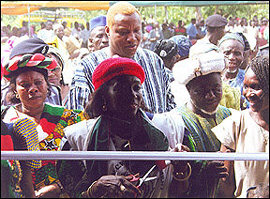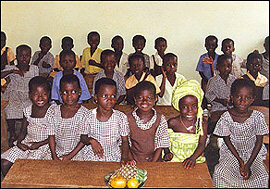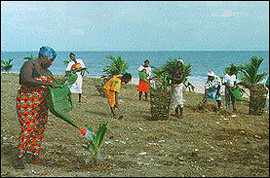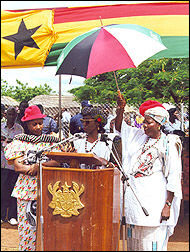
|

 Message by H.E. Nana Konadu Agyeman Rawlings Message by H.E. Nana Konadu Agyeman Rawlings
First Lady and President of 31st December Women's Movement
My desire is to see the emancipation of women at every level of development to enable them to contribute and benefit from the socio-economic and political progress of the country. Their participation will help to achieve the aims of the United Nations Declaration for Women; Equality, Development and Peace.
Women's vital role of promoting peace in the family, the country and the world at large must be acknowledged. And to do this, they must be empowered politically to equip them adequately for the challenges of critically identifying and assessing situations for the betterment of society.
The 31st December Women's Movement of which I am President is a broad-based development oriented Non Governmental Organisation which aspires to achieve these objectives through the effective mobilisation of women.
The Movement looks forward to a meaningful collaboration with all progressive organisations that share its aspirations.
Thank You
 PREFACE PREFACE
Ghana has a long history of resistance to colonialism and women have played a large part in this. No doubt the most memorable example was that of the Queen Mother of the Ashanti Stool, Yaa Asantawaa who, in 1899, led her people against the British invaders who had exiled the Ashanti King, Prempeh I to the Seychelles.
A symbol of the heroism of Ghanaian women, the patriotism and courage of Queen Yaa Asantewaa finds its counterpart today in the extraordinary daily work of the women of Ghana. In fact, the contribution of women to satisfy the needs of their communities is a major one. And this is true despite the fact that Ghanaian women are still underprivileged in many ways.
As in most African countries, they are often relegated to a secondary role due to traditional norms and practices which suppress their inherent potential. The Movement arose therefore as the expression of the will of the women of the country to take themselves in hand, to have their role in society recognised and valorised. The aim of the Movement is that women should take responsibility for themselves instead of being "assisted" persons. In this way, women are called upon to identify their own needs and establish their own priorities.
Then, they are encouraged to organise themselves in order to find the means to settle urgent problems and, when conditions permit, to set up profitable economic activities.
 STATUS OF THE 31ST DECEMBER WOMEN’S MOVEMENT STATUS OF THE 31ST DECEMBER WOMEN’S MOVEMENT
The 31st December Women's Movement was launched on May 15, 1982, in a context of political and social upheaval. It gradually became a very large women's organisation with a presence throughout the country. Today, its membership includes 2.5 million women of all social conditions, above 18 years of age. The 31st December Women's Movement is registered with the Registrar-Generals Department of Ghana, the Department of Social Welfare, the Ghana Association of Private Voluntary Organisations in Development (GAPVOD), as well as the National Council on Women & Development (NCWD) as a non-governmental organisation.
Despite the considerable economic difficulties facing the country, the issue of the emancipation of women has, since December 31, 1982, occupied a central place in the discourse and preoccupations of the nation's leaders.
For its part, the Movement has made every effort to translate this objective into reality by undertaking concrete measures aiming at the economic, social and cultural emancipation of Ghanaian women.
 THE PROBLEMS OF WOMEN THE PROBLEMS OF WOMEN
As is the case in most developing countries, Ghanaian women account for the largest part of the country's economic efforts. More than 51% of the estimated 16 million people of Ghana are women. Of these, over 70% live in the rural areas and provide about 90% of the food crops and about 70% of the various raw materials for agro-industry and also contribute about 90% of the agricultural produce. Obviously, they are also in charge of preparing the food for the family and for looking after the children. In this regard, it should be added that women, particularly in the rural areas, are frequently more alone in assuming the responsibility for the family since the men often leave to look for jobs in urban and industrial zones. In effect, because of the gender division of labour, single parenthood has become very common in rural areas and, unfortunately, is also becoming so in the urban centres.
Thus, more and more, women are faced with the sole responsibility for the family and for the upbringing of the children. Associated with difficulties is the illiteracy problem which is more common among women: 49% of women over 15 years cannot read or write compared to 30% for men. Although, to an important degree, women constitute the membership of the major professions (doctors, engineers. lawyers, etc.), women must overcome great handicaps from early age: less access to formal education than male children.
Precisely because of these social problems, the Movement places the greatest importance on the mobilisation of ordinary women so that they become conscious of their rights as well as of their potential in the economic and social development of their own communities and thus, of the country.
The high percentage of membership in the Movement by Ghanaian women, particularly in the rural areas, testifies to the enthusiasm and interest aroused by the organisation's program and activities. But it also proves the correctness of the positive vision of emancipation of women which characterises the Movement.
To advance the cause of women, the Movement is particularly careful to avoid any rupture or conflict with the social group or the couple. By addressing itself to the community as a whole the feminine organisation has made concrete progress when faced with the many prejudices concerning them.
 PROGRAMME OF WORK PROGRAMME OF WORK
 CIVIC EDUCATION CIVIC EDUCATION
From its inception the Movement has regarded the civic education of women as a vital function. Through rallies and forums the Movement has successfully raised the consciousness of women in Ghana, thus encouraging them to participate in the political life of the country, that is, to express their points of view so as to influence the decisions of those in charge of the formulation of gender policies in government. Women are also encouraged to participate in the decision-making process at the community, district and national levels.
 LITERACY EDUCATION LITERACY EDUCATION
The Movement is encouraging women to participate in functional literacy programs. In conjunction with the African Development Bank and the National Council on Women and Development, a Women's Community Development Project has been initiated which has a component to assist in the eradication of illiteracy as well as help women acquire basic skills, vocational courses and entrepreneurial development training.
 INCOME GENERATING ACTIVITIES INCOME GENERATING ACTIVITIES
Although like other NGOs it receives the encouragement of the government to pursue and develop its activities, the 31st December Women's Movement, which operates within the framework of government policies, does not receive funding from the state. The Movement therefore makes every effort to raise funds to pursue its projects from membership contribution as well as voluntary contributions and support from international organisations.

 DAY CARE CENTERS DAY CARE CENTERS
The Movement has been involved in the establishment of Day Care Centres for the following reasons:
1) To enable women to have the opportunity to leave their wards in a safe environment while they go about their activities.
2) To help mothers have the peace of mind to attain high levels of productivity in their various economic activities.
3) To offer pre-school training to children, especially those in the rural areas.
4) To promote good health in children by providing balanced meals for them.
The program for the provision of day care centres has been very encouraging as the following figures indicate:
| Region |
No of Schools |
| Central |
230 |
| Western |
36 |
| Volta |
70 |
| Eastern |
90 |
| Greater Accra |
33 |
| Brong Ahafo |
90 |
| Northern |
10 |
| Upper East |
22 |
| Upper West |
10 |
| Ashanti |
230 |
| Grand Total |
821 |
The Movement is also engaged in the training of attendants to handle the children. So far, in collaboration with the Nursery Training Centre of the Ministry of Education, the Movement has sponsored the training of 240 attendants. Many of these centres have been financed from contributions from members of the Movement as well as proceeds from the income generating projects. To enable the Movement to improve upon the structures and provide adequate teaching aids, the Movement will welcome donations from agencies both local and abroad.

 ENVIRONMENTAL PROTECTION PROGRAMME ENVIRONMENTAL PROTECTION PROGRAMME
Through their agricultural work and their responsibility in providing food and water for the family unit, African women are particularly dependent on the ecological balance.
It has also been observed that the rapid population growth has exerted great pressure on natural resources, especially forests and agricultural land used for fuel, food cultivation and animal grazing.
This is also true in Ghana, which has led the Movement to embark on an Environmental Protection Programme. In the most affected regions, the Movement has started programs of reforestation and, in general, led campaigns to introduce more efficient and less wasteful methods of energy conservation for cooking food and smoking fish. The Movement has thus identified itself with the Government's programme on the environment and is undertaking a wide range of projects aimed at:
Motivating of communities and rural people to conserve the environment;
Using wood-saving and fume-free domestic stoves; Establishing wood lots for the production of fuel-wood, for agro-forestry systems, and for the amelioration of the climate;
Organising seminars, workshops and symposia on tree planting, maintenance of bio-diversity and sustainable management of forest products;
Undertaking tree planting programs in three communities in the Northern Region of Ghana, i.e, Kusuyili, Kpachilo and Yong, to cover a total area of 9 acres, involving the planting of 9,000 trees.
Supporting the tree-planing program with 3 community seed nurseries having been set up.
Planting fruit trees such as guava, mango and cashew in Sandema in the Upper East Region
|
Over 5,000 women are also engaged in the planting of coconut and pine trees in the Greater Accra Region to check the serious coastal erosion affecting the coastline of the country. So far, 8,000 coconut trees and 2,000 pine trees have been planted. As a back up to the project, a multipurpose seed nursery project has been established at the Weija Irrigation dam site to provide seedlings throughout the year.
Notwithstanding its own efforts to date, the Movement will require a lot of financial support from donors in its efforts to contribute meaningfully towards the protection of the environment.

 ACTIVITIES ACTIVITIES
To make the branches and units of the Movement self-financing, self-sustaining, as well as to offer job opportunities to the members and women in general, the Movement is involved in providing various forms of assistance to women to engage in activities such as:
Vegetable cultivation
Raw material production to feed-processing factories
Cloth-weaving
Pottery
Cane and bamboo craft
Batik making
| Project |
No. Of Groups
|
No. Women Involved |
| Palm Oil |
62 |
2,170 |
| Coconut |
39 |
3,500 |
| Ground Nut Oil |
5 |
260 |
| Palm Kernel Oil |
23 |
920 |
| Poultry |
5 |
300 |
| Kraal |
1 |
45 |
| Piggery |
24 |
200 |
| Rabbitry |
1 |
35 |
| Beekeeping |
5 |
195 |
| Cassava Processing |
94 |
6,000 |
| Soap Making |
33 |
1,650 |
| Sheabutter Extraction |
65 |
3,000 |
| Reforestation |
27 |
6,540 |
| Citronella |
3 |
1,000 |
| Bakery |
34 |
1,734 |
| Fish Smoking |
15 |
525 |
| Vocational School |
10 |
1,000 |
| Small-Scale Goldmining |
2 |
85 |
| Breadmaking |
7 |
420 |
| Fish Pond/Farming |
3 |
88 |
| Cotton Spinning |
7 |
245 |
Handloom Cloth Weaving
|
4 |
50 |
The projects are normally identified by the women in the communities who then initiate action after carrying out pre-feasibility studies.
| CRAFTS |
| Pottery |
20 |
600 |
| Straw Basket |
39 |
2,800 |
| Rattan Basket |
1 |
43 |
| Wicker Basket |
1 |
51 |
| Batik Printing |
3 |
120 |
| Kenkey |
9 |
80 |
With this idea of self-help, the women who commence the project are assisted to complete the structures by the National Secretariat with inputs such as roofing sheets, cement and food processing equipment. Some of the women groups today depend on the activities initiated in their area.
| FARM |
| Vegetable |
120 |
6,000 |
| Mixed Crop |
520 |
20,000 |
| Roots & Tubers |
430 |
12,900 |
Mention could be made of the women of Klikor in the Volta Region who depend on cloth weaving, the women of Korkornu in the Eastern Region who process cassava into gari, the women of Bolgatanga in the Upper East Region who weave baskets, and the women of Afari in the Ashanti Region who are in pottery.
 COMMUNITY WATER PROJECTS COMMUNITY WATER PROJECTS
Under the Movement's social projects, boreholes have been dug in guinea-worm infested areas in the Central Region of Ghana to provide good drinking water to minimise the incidence of the disease. These towns are:
| Otikorang |
Swedru District |
| Kwasi Gyan No.1 |
Ajumako District |
| Deedum |
Asikuma District |
| Daadaaguado |
Mfatsiman District |
| Assin Manso |
Assin District |
| Patoako |
Abura District |
| Abeyaa |
Komenda District |
| Ayewaaso |
Assin District |
| Twifo Aboaso |
Twifo District |
| Kweku Dum |
Denkyira District |
About 70,000 people in the communities are benefiting from this service provided by the Movement.
 FAMILY PLANNING FAMILY PLANNING

With regard to family planning, a study in Ghana has revealed that knowledge of methods of prevention do not signify their use in practice. Whereas 76% of Ghanaian women know the methods of family planning, only 13% practice some form or other of prevention and even less 5% practice modern methods.
In this field, the Movement in conjunction with the United Nations Fund for Population Activities (UNFPA) is implementing a family-panning education programme in the Eastern and Greater Accra regions.The strategy adopted is to mobilise women around projects to educate them on the concept. Community theatre performances are staged as a means to move the target audience from knowledge to practice in family planning. So far, 240 communities targeted have benefited from the program.
A seminar for over 86 Queen mothers and 110 attendants was also held in June 1993 to expose the opinion leaders to family planning concepts in the hope that they will then influence people's behaviour in their communities. The second phase of the project which is to organise family planning workshops through income-generating projects is underway. The community theatre approach will also be intensified to bring more vividly the message of family planning.
 PRIMARY HEALTH CARE PRIMARY HEALTH CARE
Primary health care sessions are organised in conjunction with Ministry of Health officials. Women mobilised by the Movement are also educated on pre-natal and post-natal care.
 PILOT PROJECT PILOT PROJECT
The project to train women in construction skills initiated by the Movement, has been funded by the World Bank to train selected women in basic housing skills to enable them to assist in rehabilitating rural houses. It is also aimed at making them self-employed in the various housing skills, to earn a living out of that so as to improve their economic base.
For the pilot project, the construction of model units have successfully been completed in the following towns in the Central Region of Ghana; Essakyir, Ekroful, Attakwa and Otabynadze.
Following the successful implementation of the first phase, a second phase of the project has been proposed to benefit young women between the ages of 16-25, among them Junior Secondary School leavers/dropouts. The goal is to provide affordable housing construction and schemes currently going on. The long-term advantage is to help curb teenage pregnancies and school attendance problems as these young women will be profitably engaged.
Some of the trades to be taught are carpentry, painting, masonry, plumbing and electrics.
 31ST DECEMBER WOMEN'S MOVEMENT EXPORT FARM PROJECT 31ST DECEMBER WOMEN'S MOVEMENT EXPORT FARM PROJECT
This project is aimed at producing vegetables for export, in line with the Government's objectives to increase the non-traditional export earnings of the country.
Six hectares of land is under cultivation. The main vegetables grown are cluster beans, tinda and pepper. There are however, plans to increase the acreage and the varieties of vegetables grown, with produce like okra, bitter gourd, sponge gourd, etc., which are in high demand in Europe. Over 22.5 tones of fresh vegetables have been exported to Europe from January to June 1994.
Apart from generating income to support the Movement's activities in the rural areas, the project is also serving as a source of employment for women within the locality. Because the project is under careful management and good agronomic care, it is serving as a practical training and demonstration farm for students in the Junior and Senior Secondary Schools as well as for the country's Universities.
 TECHNICAL CO-OPERATION TECHNICAL CO-OPERATION
The Movement has received technical assistance from the following countries to improve rural women's skills in the following areas;
India-Pottery, Textiles
Japan-Textile, Beekeeping, Cane Weaving
Cuba-Building Construction Technique
Netherlands- Food Processing
Some donor agencies have also supported specific programs:
UNDP-Reforestation Program in Northern Ghana
UNFPA- Population Program
USAID-Population Program
ADB- Women's Community Development Programme
UNIFEM-Guinea Worm Eradication
Sasakawa-International Food Processing Factories
IFAD-SCIMP- Small holder Credit Input Supply and Marketing Project.
 INSTITUTIONAL CO-OPERATION INSTITUTIONAL CO-OPERATION
As a registered NGO, the Movement enjoys close co-operation with the Ministry of Employment and Social Welfare, the sector of the Ministry responsible for the co-ordinating of the activities of NGO's as well as the National Council on Women and Development.
It also enjoys close collaboration with the Ministry of Education on pre-school education as well as adult literacy; the Ministry of Health on primary health care and mass immunisation; the Ministry of Agriculture on farming; the Ministry of Industries on small scale manufacturing; and local financial institutions on creditfacilities to women. At the International Level the Movement is in the process of affiliating with the International Council of Women (ICW). There are also co-operation arrangements between the Movement and Japan Relief Clothing Centre, SESCO, as well as Sasa Gakki International, all of Japan.As the Movement looks to the future, it sees better prospects for Ghanaian women founded on the major strides made by Ghana since the early 1980's; the gains women have made in legislation and programs that protect their interest; and in the continued support for the Movement by both Ghanaian men and women, the Government of Ghana and the international community.
|
© World INvestment NEws, 1999.
This is the electronic edition of the special country report on Ghana published in Forbes
December 13th 1999 Issue.
Developed by AgenciaE.Tv |
|
|
|
|
|
|
|
|
|
|
|

